By Anna Betz for Enlivening Edge Magazine
Being there felt like being in an expansive space buzzing with the mental, spiritual and emotional energy of 500 participants busy with making “Teal” real, by bursting into action individually and collectively.
One of my heartwarming highlights was the poignant openness of some of the CEOs sharing experiences of pain and even failures, and how in spite of all, they still continue the transformational journey of themselves and their organizations.
Another heartwarming highlight was that the organizers created a space that enabled meaningful connections between people and mindsets.
Instead of sitting in rows and listening to one sage-on-the-stage after the other, 500 chairs were organized in small circles and participants were given some generative questions with guidance for deep listening.
The Second China Organizational Evolution Forum (1) (2-3 November 2018) in Shanghai organized by Weidong Lu and Fiona Xue, attracted the 500 participants and a stellar, international line-up of speakers and workshop leaders, including Frederic Laloux, John Bunch of Zappos (2), many Chinese thought leaders, and Enlivening Edge’s own George Pór.
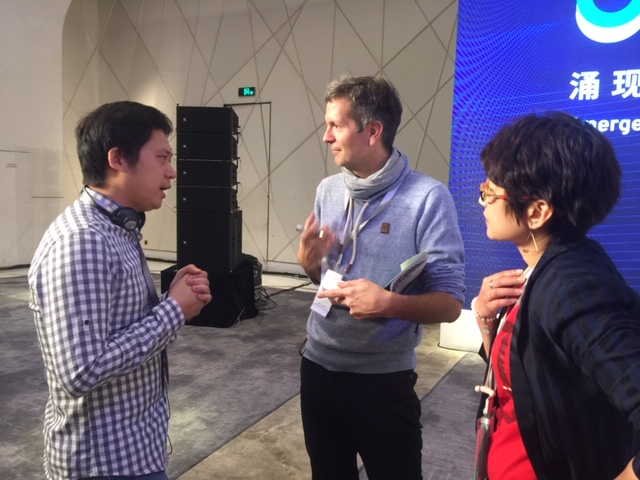
Presenters came from both East and West. They ranged from owners and leaders of manufacturing companies to young designers from the fashion industry, business consultants, leadership trainers, practitioners of governance systems like Sociocracy & Holacracy, and a CEO (see Dong Tang, below) applying a model called Token Economy(7) using Blockchain to large people-centric organizations.
My main take-home value from the Forum
For me, as one of the Western participants of the Forum and as a “reinvention” consultant in my work, it was very heartwarming to learn about the first victories, trials, tribulations, and dedication of our Chinese colleagues.
I felt also very inspired by the humility, mindfulness, and wisdom of my new Chinese friends, who are engaged in gently morphing old organizational structures and cultures into new ones that are putting an end to the alienation of workers from their work and each other.
The translation and phenomenal success of Reinventing Organizations in China is catalyzing a new momentum for the planetary Teal wave.
Strengthening the connection and collaboration between Chinese and Western practitioners, and learning from each other, will accelerate our co-evolution. Inspired by my first trip to China and what I experienced at the Forum in Shanghai, I want to make my own contribution to it.
What follows are a few glimpses of the 2 days which might surprise and inspire you.
Celebrating failures in a fashion business
Alex Yin is the CEO of a very successful fashion company called UOOYAA (3) with over 80 stores in China.
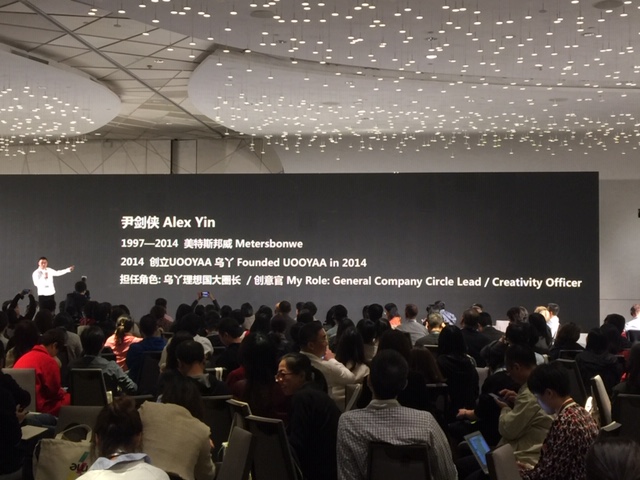
The fashion company is organized in circles using Holacracy principles for governance. Treating employees and consumers as humans and liberating everyone’s potential is part of Alex’s mission. According to him, making mistakes and learning from them is part of the journey. UOOYAA’s organizational structure includes emotional sharing sessions.
Two 26-year-old designers who had never spoken in public before this conference, shared stories about working in this non-hierarchical organization, about their soul connection to other employees and how they care for each other.
They also shared mistakes they had made when they were too critical about each other’s working style. I was very touched by the authenticity with which they shared their own weaknesses.
One of their stories was about the failure of a new fashion collection and how they dealt with that, how they worked with their own self-doubt and moved on quickly beyond the problems. They organized a meeting called ‘celebrating failures’ which opened the space for everyone including top designers to engage in honest dialogue to help each other, rather than look for someone to blame. They ended the failure meeting with Karaoke.
In Alex’s words: ‘When trust is built first, honesty can be empowering to everyone. Failures can always happen and should open us up rather than shut us down.’
Home Group Sharing in small circles and pairs in between presentations (15 mins)
Throughout the forum, participants kept self-organizing in small circles or home groups to enquire together into some generative questions. The guidance for deep listening helped to create trust and encouraged authenticity.
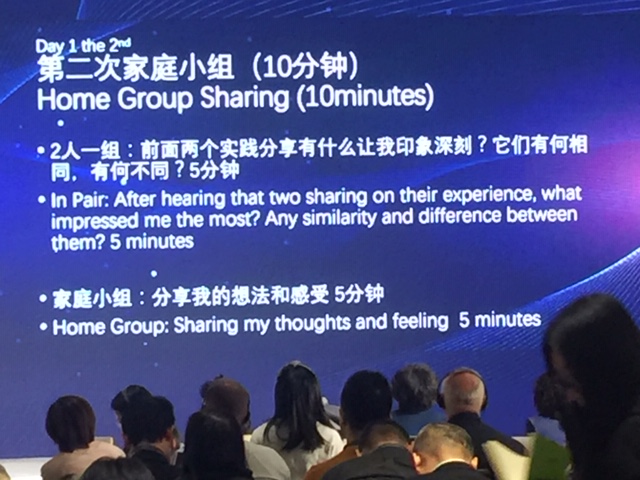
“For being around in 1,000 years, we need diversity”—a lesson from Zappos
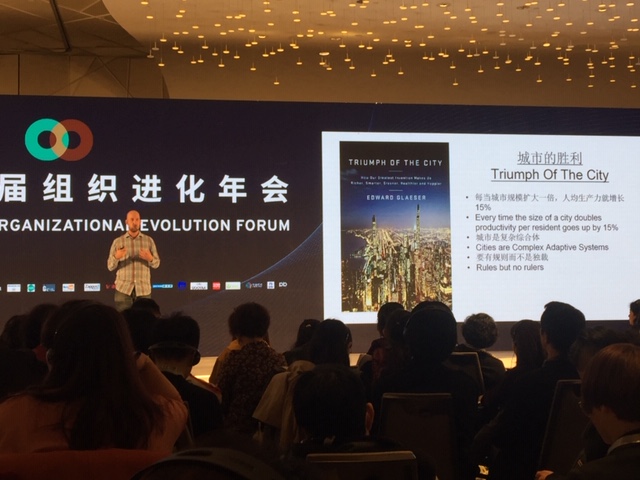 John Bunch of Zappos started his presentation with this question: How can you evolve within one lifecycle? In biological lifecycles it takes a whole lifetime to evolve. Within organizations, every week or day is an opportunity to evolve. Organizational change speeds up evolution.
John Bunch of Zappos started his presentation with this question: How can you evolve within one lifecycle? In biological lifecycles it takes a whole lifetime to evolve. Within organizations, every week or day is an opportunity to evolve. Organizational change speeds up evolution.
John has been with Zappos for 9 years and feels a deep connection to it. He said that everyone at Zappos has to be a good fit for the culture, to live and breathe the culture. This applies even to techies.
As Zappos continued to grow, they explored methodologies for becoming more agile. This was when the Reinventing Organizations book became one of their inspirations for change in a complex world.
They started experimenting with Holacracy in 2014-15, then rolled it out across the whole organization. It also means people can fill multiple roles that serve the purpose of the organization. One person can be in 10 or more circles and energize even more roles within all those circles. Allowing everyone that kind of space to grow, to develop and express and their capabilities, allows for much quicker evolution.
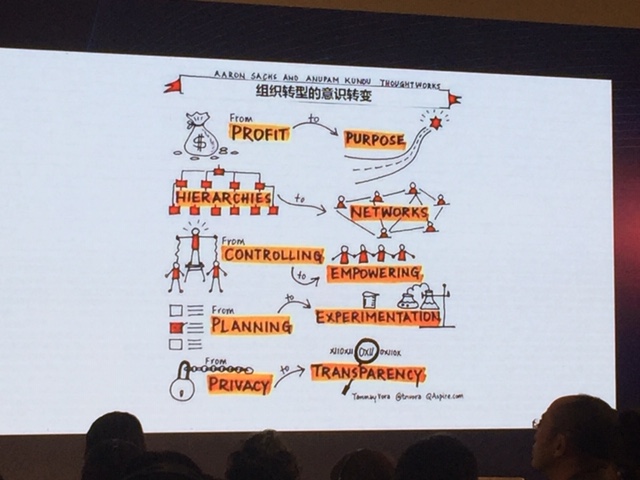
A question Zappos is presently exploring is: How can we make even more steps away from hierarchy, towards networks in our structure? Holacracy is not a hierarchy of people but a hierarchy of work with circles operating as small businesses in the ecosystem. As Zappos wants to be more diversified and anti-fragile this question is becoming central: How can we grow more business lines, internally?
For Zappos, 2019 will be the year for moving further away from “top-down” to being more networked internally and discovering what “being networked” can do for their circles.
The underlying WHY question Zappos is exploring is this: “How can we make businesses more resilient?”
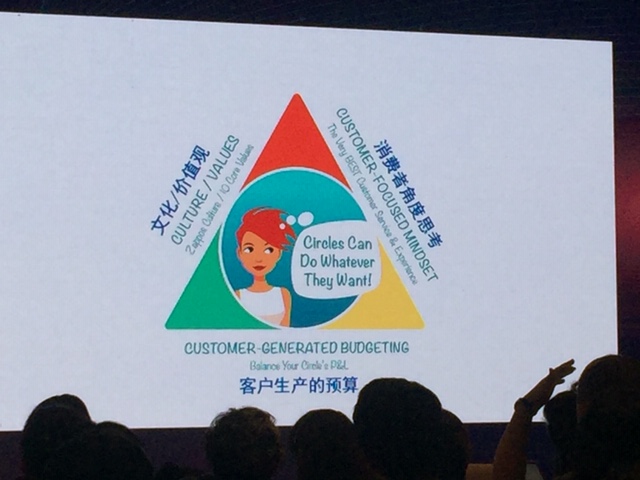
Zappos is a “customer service” company and is aiming to have the very best customer service not just to outside customers but also to internal customers. With this focus, circles will be able to do what they want as long as they keep to agreed values. Every circle will need to develop a customer-focused mindset, elicit a wow! experience, and also bring in more money than they spend.
They are passionate, purposeful, and determined to look at both the long-term and short-time outcomes as equally important.
The games and “tissue fluid” of a machine automation company
Dong Tang is an energetic leader and the founder & chairman of Kinco Automation (4), one of the leading suppliers of machine automation solutions in China. The company has received several awards for technology innovation and excellent management. Dong has been exploring the concept of Teal organisation and introducing Teal practices in his company, since 2015.
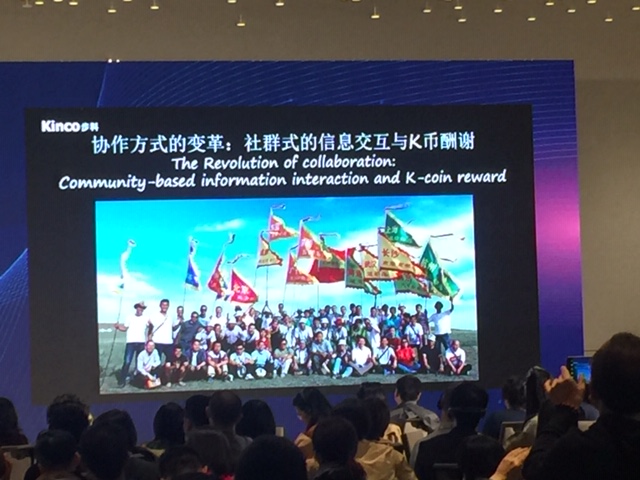
Playing games with his children inspired what he described as a revolution: Players get organized in tribes and can change rules as they figure out improvements. Everyone is invited to play. Kinco’s games are used in schools in China and also in Germany.
The book that inspired him to pursue his quest, besides Laloux’s Reinventing Organizations was How Games Can Change the World. (5)
At Kinco, it is a priority to keep employees passionately engaged. To meet the need for continuous development and innovation, Dong realized that one type of company was not enough, which is why each product at Kinco is now a company. Together they form a collaborative community that he compares to the tissue fluid in a living system.
Evolutionary organizations need to enable personal development, mindshifts and behaviour changes which old-style management doesn’t do.
Dong himself mentors and coaches new managers and recruits staff. He also supports staff in facilitating World Café meetings and believes in the use of powerful questions to challenge unhelpful habits and behaviours.
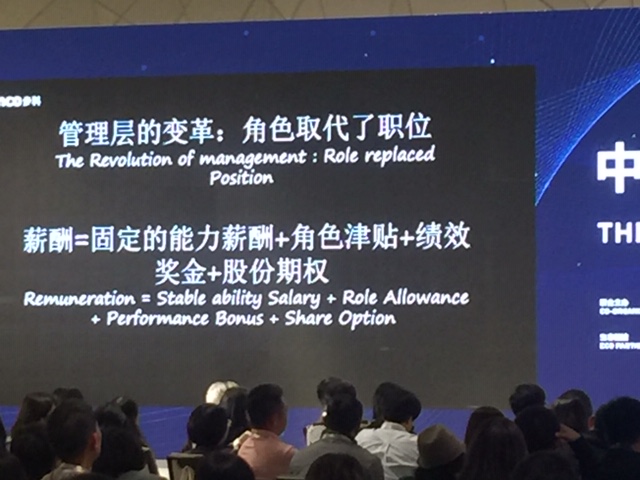
Instead of set salaries, employees receive allowances and bonuses. When they move to a role that is traditionally on a lower pay scale, their salaries are not reduced. Working with a number of different ways to get paid took some time for people to get used to, but despite all the challenges it is working now.
Dong’s advice to other CEOs: Don’t wait too long, start now!
Working without bosses in the world’s largest tomato-processing company
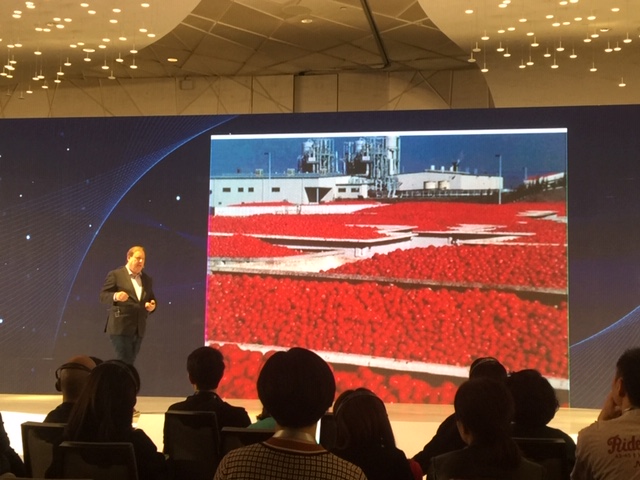
Morning Star (6) is the largest tomato processing company in the world which never had a boss. It is totally self-managing.
Doug Kirkpatrick explained how Morning Star started with these simple principles:
- Don’t use force, to enable happiness and prosperity in the world.
- Keep to your promises and commitments.
- Own your principles and don’t build a house without foundation.
- Human beings are the ultimate reality and the social drivers.
- Organizations need to engage hearts and minds.
- If in the company someone discovers that he/she can’t keep a commitment they have the responsibility to renegotiate it to keep energies moving.
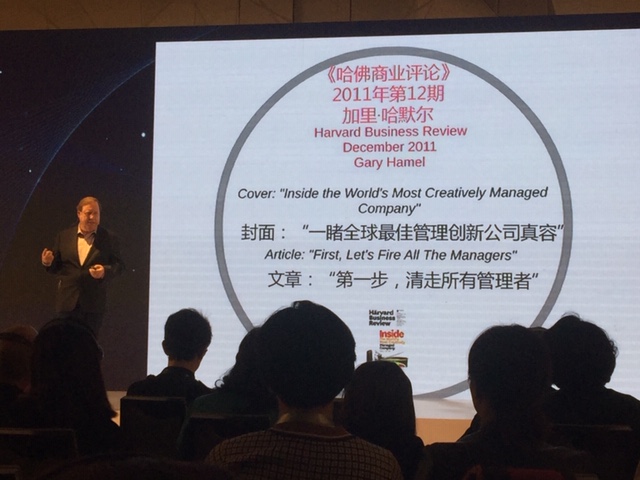
The company operates in California and started in a farmhouse in the 90s, inspired by this question: Why do we need a boss when we know what needs to be done? Furthermore not having a boss can save the salaries of 3 ordinary workers. People don’t have a manager in their personal lives to make decisions daily about what they need to do. Why do they need managers at work? Bureaucracy wastes human life by slowing things down. It stops engagement and wastes time.
Command and control leadership makes people weaker. Natural leaders can rise in self-managed systems.
Leadership can rise up spontaneously wherever and whenever needed.
It makes people stronger as everyone is responsible for everything that comes in based on their level of awareness.
Morning Star has zero command-based leadership. Workers are leading together. Rather than offering empowerment programs which according to Doug actually don’t work, Morning star believes in actual power for everyone and in the cycle of vibrant generosity.
References:
(1) http://forum.chinafuturework.com/
(3) https://www.yatzer.com/unfinished-space-uooyaa-office
(5) https://www.fin24.com/Opinion/book-review-how-games-can-change-the-world-20171207
(6) http://www.morningstarco.com/
(7) https://www.digitimes.com/news/a20180913PD208.html
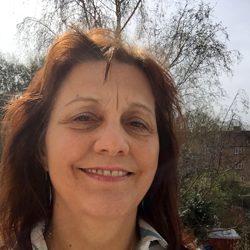 Anna’s background is in Health and Social Care with training in Herbal Medicine, Socialwork, Mindfulness Practice, Transparent Communication, and Systemic Family Therapy. She practices a pro-active evolutionary approach to Health and Wellbeing and leads on projects in the UK National Health Service using Mindfulness and diet for people suffering from chronic inflammatory diseases like diabetes and dementia. Her passion for building thriving and sustainable communities inspired her to co-found the HealthCommonsHub. She feels at home in places where individual, communal, organisational, and social evolution meet, and where people support each other in becoming whole and feel enlivened.
Anna’s background is in Health and Social Care with training in Herbal Medicine, Socialwork, Mindfulness Practice, Transparent Communication, and Systemic Family Therapy. She practices a pro-active evolutionary approach to Health and Wellbeing and leads on projects in the UK National Health Service using Mindfulness and diet for people suffering from chronic inflammatory diseases like diabetes and dementia. Her passion for building thriving and sustainable communities inspired her to co-found the HealthCommonsHub. She feels at home in places where individual, communal, organisational, and social evolution meet, and where people support each other in becoming whole and feel enlivened.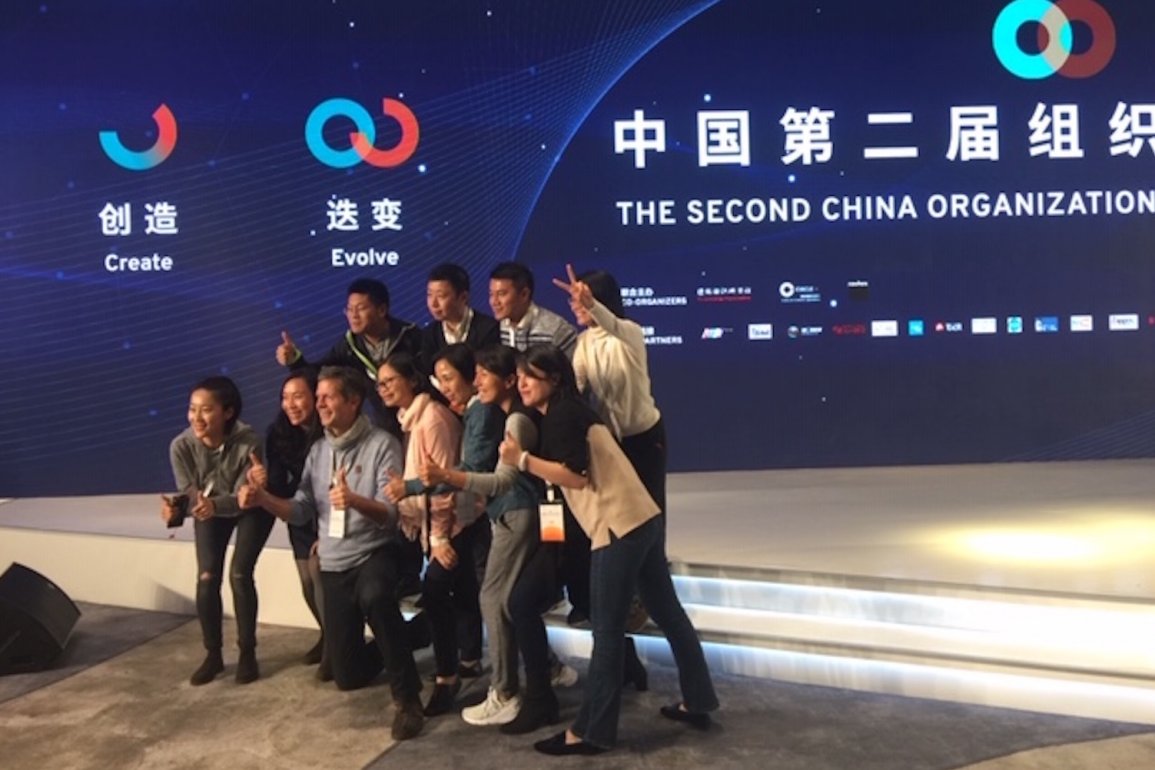


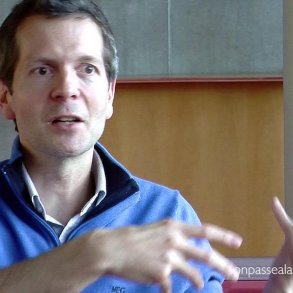

Hi Anna; thanks for the great piece! I might note that my last name is Kirkpatrick, not Fitzpatrick. THANK YOU! Bests, Doug
We fixed it Doug. Sorry! Glad you spotted it and told us!